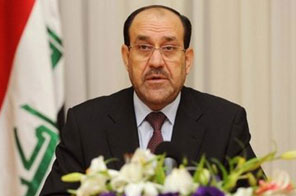Iraqi PM to be grilled over bombing
BAGHDAD: Iraqi Prime Minister Nuri al-Maliki will submit to a grilling Thursday by furious MPs demanding to know how Al-Qaeda bombers slipped past security cordons to launch devastating attacks in Baghdad.
Maliki, who sacked the capital's security chief on Wednesday, was called before parliament after the coordinated bombings killed 127 people and wounded 450.
Police have claimed the bombers were backed by groups based in Syria or Saudi Arabia.
Lawmakers have demanded answers over Tuesday's blasts, which killed more people than violence in all of November, undermining claims of improved security ahead of March 7 elections.
"Parliament will host Maliki over the recent attacks," said his media adviser Yassin Majid.
"He will go alone, and if there is sufficient time, then parliament will listen to the ministers in charge of security."
Interior Minister Jawad al-Bolani has also agreed to be questioned, but only if the session is public.
Maliki's questioning is expected to begin at 1:00 pm (1000 GMT), a parliamentary official said.
Furious MPs demanded to know who in the security forces had allowed the bombers through in explosives-laden vehicles.
"There is huge anger in parliament because of the security violations," Falah Shanshal, the chair of the justice committee, told AFP Thursday.
"We want to know who was negligent, in order to punish them and replace them with someone else. Today's session is to understand the failures, to stop the security violations and to find a solution because the blood of Iraqis is being shed every day."
The Islamic State of Iraq, an Al-Qaeda group, issued a statement on a forum for Muslim extremists saying it carried out Tuesday's bombings, according to US monitoring group SITE.
The statement, published on Wednesday, threatened more attacks, saying the latest carnage was the "third wave" in an ISI campaign following bloody days on August 19 and October 25 that left a total of 250 people dead.
"The list of targets will not end, with permission from Allah, until the flag of monotheism is raised once against on the land of Baghdad and the sharia of Allah rules the land and the worshippers," it said.
The group also claimed responsibility for a suicide bombing in Tikrit, the home town of executed Iraqi dictator Saddam Hussein, that killed a senior anti-terror officer on December 3.
Meanwhile, Maliki fired the military officer in charge of the capital's security, Lieutenant General Abbud Qanbar.
Lieutenant General Ahmed Hashem Awudeh will succeed Qanbar, who will take up Awudeh's old job as deputy army chief of staff.
In a sign of tighter security, increased numbers of soldiers and policemen were out on the streets of central Baghdad on Thursday morning, and at least one bridge was closed off.
A senior policeman said on Wednesday that the explosives used in the attacks were manufactured abroad and that the bombers were backed by groups in Syria or Saudi Arabia.
"This material could not have been manufactured in Baghdad; it came from abroad," Major General Jihad al-Jaabiri, the explosives unit chief said.
"Neighbouring countries helped them. The operation required lots of funding, which came from Syria or Saudi Arabia."
Jaabiri said Al-Qaeda and backers of the Baath party of executed dictator Saddam Hussein were behind the blasts.
Tuesday's bombs all exploded within minutes of each other.
One suicide attacker detonated his payload at a finance ministry office, another struck at a tunnel leading to the labour ministry and a third drove a four-wheel-drive vehicle into a courthouse.
A fourth bomber in a car struck a police patrol in Dora in south Baghdad, while a car bomb hit interior ministry offices in the centre of the capital.
Attacks across Iraq dropped dramatically last month, with the official figure of 122 being the lowest number of deaths in attacks recorded since the 2003 invasion.
Both the Baghdad government and the US military have warned of a rise in attacks in the run-up to the election.
Despite Tuesday's attacks, US forces remain on track to begin withdrawing from Iraq in large numbers next year, said Admiral Michael Mullen, the chairman of the Joint Chiefs of Staff.






